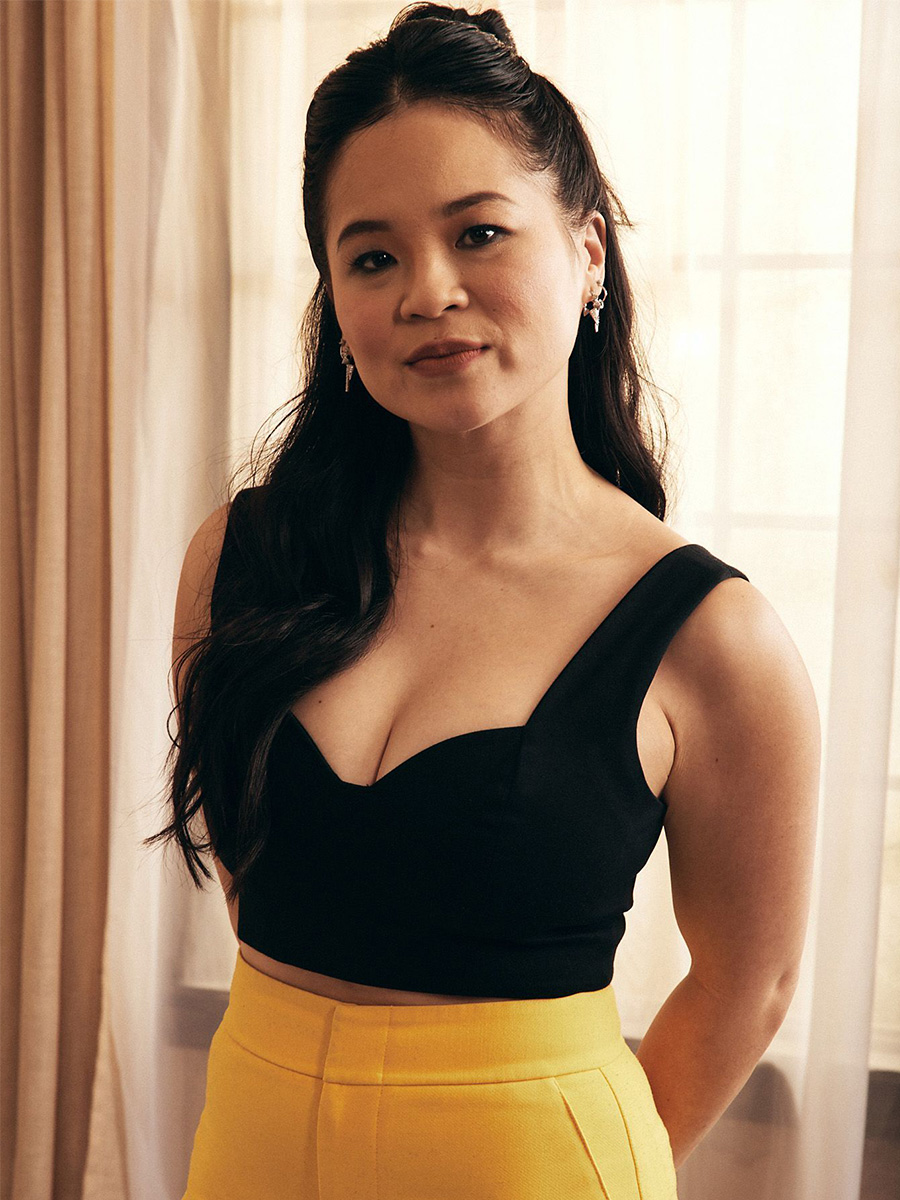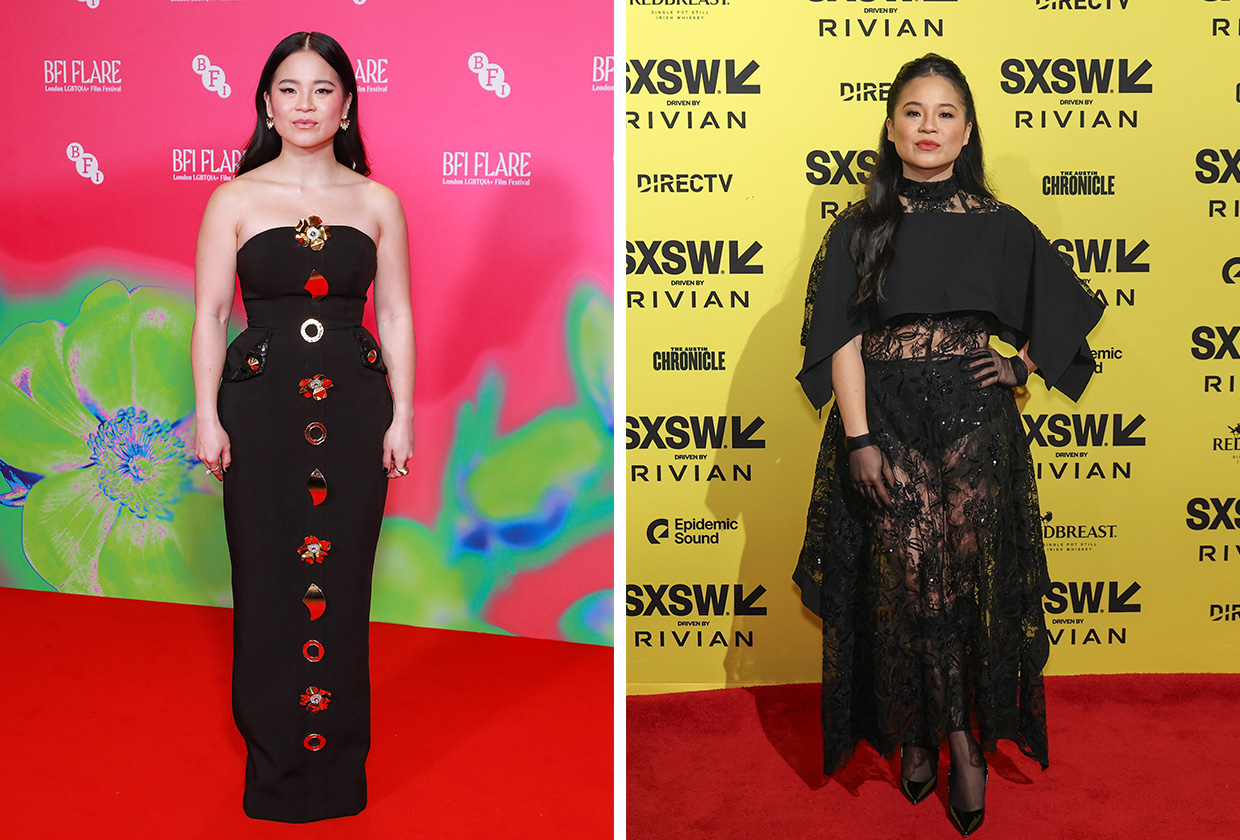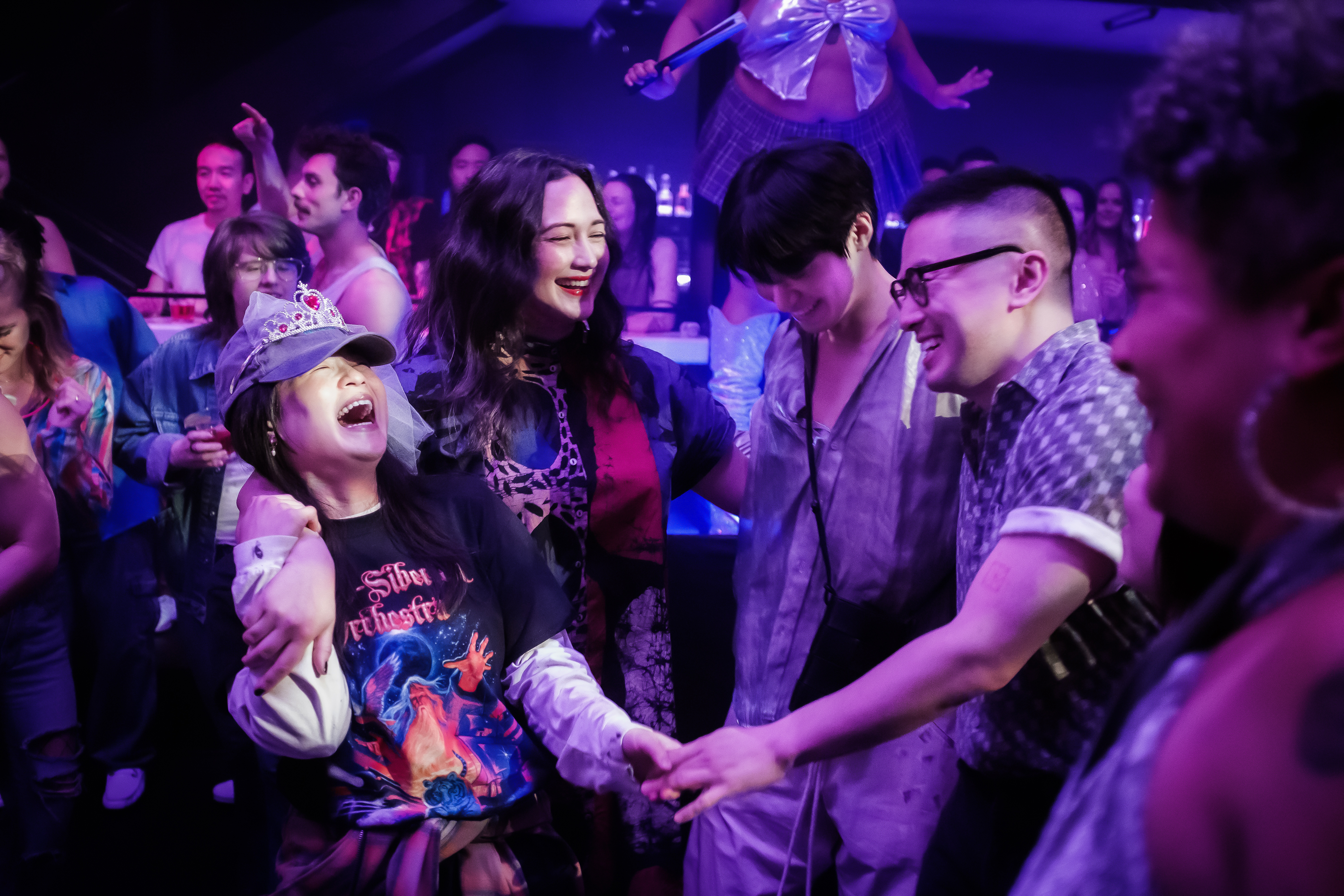Kelly Marie Tran Cordially Invites You to a Celebration of Queer Joy


Do you hear that?! It's the sound of wedding bells ringing. Yes, wedding season is officially upon us, and it's not just the embossed invitations arriving in our mailboxes, the gorgeous gowns that made their debut at New York Bridal Fashion Week last week, or even the recent influx of wedding guest attire roundups. We're feeling the love on-screen, too, as we are cordially invited to partake in Andrew Ahn's joyful queer comedy The Wedding Banquet. A contemporary remake of Ang Lee's critically popular 1993 film, it's the romantic event of the season.
Ahn's version, which first premiered at the Sundance Film Festival this January, centers on two gay couples, Angela (Kelly Marie Tran) and Lee (Lily Gladstone) and Min (Han Gi-chan) and Chris (Bowen Yang), who live on the same property. We meet both couples at an impasse in their relationships. Angela and Lee are trying to have a baby but are struggling through unsuccessful IVF treatments, while Min is being called back to South Korea by his grandmother to run the family business. In order for Min to stay in America with Chris and pursue his dream of being an artist, the friends hatch an elaborate plan: Min would marry Angela to satisfy his conservative family, and in exchange, Min would offer Angela and Lee financial support for additional IVF trials. What could possibly go wrong? A lot, it turns out.
For star Tran (Star Wars: Episode VIII The Last Jedi and Raya and the Last Dragon), making The Wedding Banquet was as much about creating a home and a chosen family off-screen as it was about portraying authentic queer experiences on-screen. The result is a perfect marriage of humor and heart that is a must-see.

The Wedding Banquet is a remake of the 1993 Ang Lee film, which, at the time, saw a lot of critical and commercial success. What was your relationship with the original film going into this project?
I had seen it, but it was a long time ago when I was younger, and I didn't remember it. But obviously, I knew Ang Lee's work and was obsessed. I did a rewatch of it actually right before Sundance, and I'm really glad I did that because Andrew and [cowriter] James [Schamus] have put these really cool little references into our film—like the moment when Min and Angela are at the courthouse about to get married and Min's like, "Do we need to switch spots?" And the guy is like, "I don't care." In the original [film], he asks the couple to switch spots. There are these cute little references that I love, and the very last scene in the original film is so iconic, where he raises his hands at the airport. That was what Andrew was referencing in the scene with Angela at the end when she raises her hands yawning. There [are] little things like that that I think are so thoughtful, and that says a lot about Andrew and James and how thoughtful they are and how much they wanted to honor the original, even though we were definitely taking it in a different direction and reimagining the whole thing.
We love a good Easter egg. What conversations did you have with Ahn about his vision for this remake and bringing the story into current times?
I don't know if we really had that many conversations specifically about that because it was all already there in the stript. I also think that, for the most part, so much of the experience, for me and also for the crew and a lot of people working on the set, was that we're queer people living in today's world. It was almost like we didn't have to have conversations about it.
In the script and in the story as it is, seeing a lesbian couple go through IVF is such a wild thing. I don't think I've ever even seen it in any other film or television [show], honestly. We really wanted that to feel authentic, and actually, there's a moment in the scene where Lee is being inseminated when Angela kind of cheers her on like it's a sports game, and that came from one of my best friends from childhood. At the time we were filming The Wedding Banquet, she was going through IVF, and it was not going well, but she had sent me this video of her and her partner having a similar experience, and her partner was cheering her on like it was a sports game. I showed it to Andrew, and Andrew was like, "Let's do that." So there are moments like that where it was really cool to just use real-life experience. I hope we did a good job.
Absolutely. On the topic of IVF and motherhood, Angela's rocky relationship with her mom has a strong influence on her own thoughts on parenting and becoming a mother. She's clearly torn on the idea. Did this storyline impact your own thoughts around having children?
It's a multifaceted question, but I will say that I absolutely have a complicated relationship with the idea of having a child. I think that … maybe is doing a lot of self-work and therapy about the way that I was raised and having to examine that and recognize the parts of myself that reflect that and reckoning with the idea that "Oh, am I wanting to pass this on to someone?" … Also, we're living in such a scary world and a scary time.
That being said, I do think children are some of the greatest joys in the world. … The ability to see the world through the eyes of a child is, I think, maybe one of the most healing experiences that a person can have, so I would never blame anyone for having a child. I just think that it is a complicated experience that we're now living in. I'm a millennial, and I think my parents didn't have the privilege to do all this psychological work and go to therapy and go to support groups, like the stuff my sisters and I are able to do. There was none of this sort of forethought for them. It was just a thing that you did. Now, acknowledging the privilege that I have and many people in the millennial generation and Gen Z have is that we have the time and the money and the privilege to go to therapy, and if we don't have that, we have TikTok, you know? Yes, I am also an attendee of TikTok University. I just feel like it's a lot more complicated than it was.
Angela has a complicated relationship with her mother, who essentially uses Angela's sexuality to raise her own profile as an ally. You publicly came out as queer last year. How does Angela's experience compare to your own?
It's such a complicated thing. Half of me is like, "I just wanna be honest and tell you how it happened," and the other half of me is like, "I still love my parents regardless of how complicated it is." I will tell you a little bit about the situation, which is that, yes, it was a complicated coming-out for me personally, and yes, I channeled all of that into this movie. I think the problem, again, with being a millennial is that if you really are doing the emotional work that we are afforded the privilege to do, you know too much, and therefore, you can't actually hate anyone because you know where they are coming from. I feel that way about the response that I got from my mom specifically, which is that I recognized that she was raised in a country that is so patriarchal and conservative, and she was raised that way. So it's not her to be mad at, really. It's the world at large that has created this type of mentality and this type of fear around a group of people that she may not have been exposed to.
The wildest thing is that there are so many people in the world who may not be afforded the privilege of travel or of access to be in spaces where you are exposed to queer people. We've seen throughout history [that] queer people—and I will also say people of color and many minority groups and many underrepresented groups—are the scapegoat for whenever someone is in power and they want to distract everyone else. They're like, "You know what? Let's point the fingers here." I have had the experience of so many people who have been socialized that way—who, when they are exposed to these other communities, are able to see and ask themselves questions like, Why do I believe this when this does not feel like I should be afraid of or I should be hateful of? My hope for this film is one of exposure to a community that is so full of love and acceptance. I'm getting emotional thinking about it because chosen family is so important to me and to the people who worked on this film, Also, I think it should be important to the world at large, this idea that "Hey, if you were born into a situation that does not feel good, where you're not being loved and you're not being appreciated and you're not accepted, there are people in the world who will love and appreciate and accept you, and I want that for you."

That goes perfectly into my next question because chosen family and home are really big themes in this film. I would love for you to talk a little bit about creating both of those in the process of making this film.
There was no pressure for us to become friends or to become a family, but it was so easy because we were all living in Vancouver, which none of us live in. On the weekends, we wanted to do things, so we would go on hikes. I remember one time we as a group went to see an elderly Korean choir sing Mamma Mia!, and it was such a wholesome experience. We also got a group together to see Fancy Dance come out, so there [were] just familial vibes, period. I think that a lot of that comes from Andrew. A lot of that comes from the cast, from Bowen, from Lily, who are just the most generous, authentic humans. By the end, all four of us would be watching Couples Therapy and making popcorn and hanging out between takes. We'd be doing a full scene, and they were like "Okay, we're doing another setup," and we'd be like, "Cool" because we'd be so excited to go back and see what Dr. Orna was up to. It was awesome.
Do you still have a Wedding Banquet group chat?
There is a group chat. We also text each other individually. I'm going to see Bowen on SNL this weekend, so I'm really excited about that. I love them all, and now, I'm a forever fan. I'm gonna be there forever supporting everything that they do, so I'm so excited that I got to be a part of this. Not only was the experience so beautiful, but the thing that we made was a reflection of the relationships that we made with each other off set. It's just really, really exciting, and I'm grateful.
Ahn said the 1993 Wedding Banquet film was the first queer movie that he ever watched, and I was curious—what are some of the queer movies that have really been meaningful in your own life?
I honestly think it was Rent. That film came out in 2005, and I was already deeply in my musical theater phase, which I'm still in currently. But yeah, Rent is probably the most important piece of queer representation that I saw as a younger person. Now, there's a lot of stuff that I love. There's this show Feel Good. It's Mae Martin and on Netflix. I'm obsessed with it. There's just so much more now, which I'm excited to be part of that [with The Wedding Banquet]. I think we've already talked about this, but the hope is that there is exposure to a community that I think the world at large may have been taught to fear, and with that exposure is hopefully recognizing a common humanity and not being afraid.
Can you speak to some of the other projects you have coming up?
I'm really grateful that I'm currently in a position where, this last year, I got to work on four movies, and every film that I did was with an Asian writer-director, and I think three of them were queer. I'm just really excited about making art about these identities and parts of myself that maybe 10 years ago I was taught to be ashamed of or I was taught to fear. So that's the hope going forward, to continue to do that. It doesn't mean that I only want to do things that reflect those identities in myself, but it means that I'm absolutely taking that seriously, and I want to continue to do that. Actually, two of those filmmakers were also first-time filmmakers, so that was also exciting. One of the films, Forge, opened SXSW this year, and it's an art heist movie, and I think Jing [Ai Ng] is such an incredible writer/director, and then the other movie doesn't come out until next year. To answer your question, I'm very much prioritizing working with Asian writer-directors, with queer writer-directors, with first-time filmmakers that I think are exciting and interesting, and it's really cool to be making art about these parts of myself.
The Wedding Banquet is in theaters April 18.
whowhatwear





